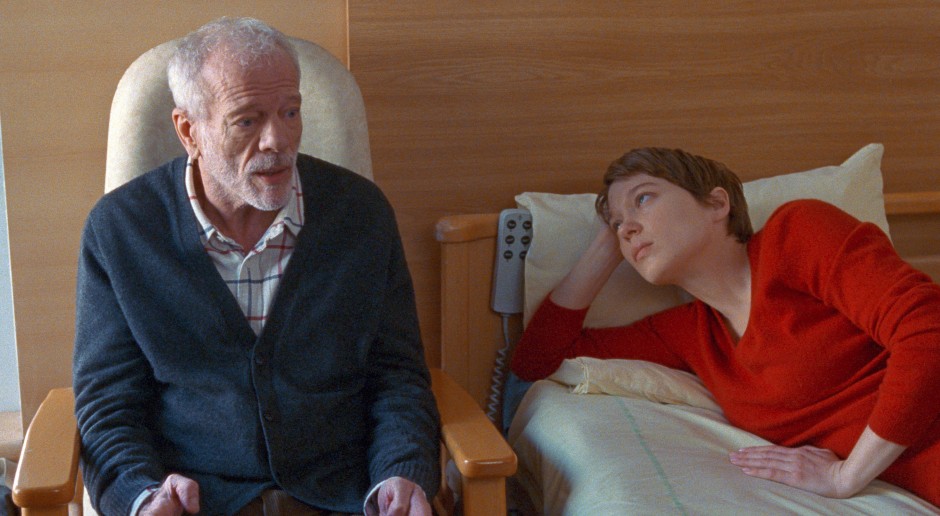
Et might surprise you that it should still be something special today: a complex female main character in a film. One who is not just a lover, or a mother, or a daughter, or an employee, but all at once. And who seems to have infinite patience, but no will to sacrifice herself.
That’s how it is in “On a Fine Morning” by French director Mia Hansen-Løve, and anyone who sees the film immediately notices that something is different here. There is a woman who is a single parent, who takes care of her ailing father, who falls in love with an old friend, who works as a translator and in whose life all these things are equal – and there is a film that speaks to all these aspects equally Interested.
In the first scene of the film, Sandra (Léa Seydoux) stands in front of her father’s (Pascal Greggory) apartment door and rings the bell. “I’m coming,” is heard, and then, “But where is the . . .?” – “The key?” – “Yes, the key.” – “The key is in the door, you always leave it there.” After a short pause, the father’s voice is heard again: “But . . . Where is the door?”
This beginning of the film works so well not only because it sketches the relationship between father and daughter in a few sentences, which is marked by the neurodegenerative Benson’s disease from which the former German professor suffers. With the threshold motif, the beginning also shows the beginning of the narrative as a bumpy entry into fiction: where is the key, where is the door to tell the entry into this story?
A key lies in the protagonist and also in the outstanding cast of the film. As Sandra, Léa Seydoux, as she says in an interview, “finally can portray a normal woman”. She plays the role without make-up, with short hair and in a baggy sweater, which might not matter, but is still nice. Pascal Greggory is also perfect in the role of the father.
An outstanding ensemble
He is never just forgetful and frail, but also subtle, almost mischievous, which gives his illness something comforting even when he is passed from facility to facility due to lack of space. In addition to Sandra’s daughter Linn (Camille Leban Martins), who is also pleasantly far from any cliché of an eight-year-old girl, there is also Clément (Melvil Poupaud), whom Sandra meets again by chance a few years later. He was a friend of Sandra’s late husband and is married with a son Linn’s age.
Clément is an astrophysicist, or “cosmochemist,” as he always corrects Sandra, and that plays a role, just as much as Sandra’s job as an interpreter is shown in detail again and again. It is no coincidence that they kiss for the first time at his work, in a film that shows his characters as working beings in a way that is rare in cinema.
Incidentally, “On a Beautiful Morning” is also a small reflection on seeing, on perception and film aesthetics. There is the father’s illness, which also affects his eyes. Sandra asks him what else he can see, and he replies that, for example, he can very well see her. Her summer dress with the flowers? Yes, of couse.
But the next thing he guesses is that she probably has long hair rather than short hair. The fact that the father stops seeing her, both literally and figuratively, and instead always asks about his girlfriend, is painful for Sandra, although it can be attributed to the illness. Then there are the children’s films that she sees with her daughter in the cinema. Linn is delighted and then angry when the mother says she doesn’t like her.
Discreet distance
“Too aggressive” are their colors and tones there. “On a beautiful morning” itself escapes both extremes: he looks very closely, he is never aggressive. The camera maintains a discreet distance. She is sensitive but not intrusive and is thus similar to how family members interact with one another. They understand and support each other, but also convey the attitude: everyone has their own life.
It is fitting that there are few actual close-ups, rather the view of whole bodies that are constantly in motion. This makes the film very sensual and, unlike in the French film tradition à la Rohmer, never cerebral. In one of the most touching scenes, Sandra, her daughter and Clément sing together in the nursing home. The chanson “Mon amant de Saint-Jean” makes Sandra cry and thus makes her a mirror figure of the film audience.
A reference in the credits reveals that Mia Hansen-Løve also tells part of her story here. Ole Hansen-Løve, the director’s father, wrote one of the texts from Sandra’s father’s autobiographical notes. Nevertheless, “On a Beautiful Morning” goes beyond the autobiographical dimension. It shows a contemporary woman in a way that is perhaps only possible in France and maybe even only at Hansen-Løve – and yet it tells a universal, very tender story.









